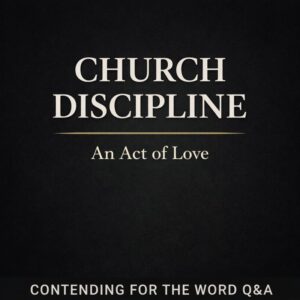⏱️ Estimated Reading Time: 3 min read
When Christians Must Judge—and How to Do It Right
Our culture often repeats the phrase, “Do not judge.” It’s used as a shield against any form of moral evaluation, correction, or discernment. Even among Christians, Matthew 7:1 is sometimes quoted as if Jesus forbids all judgment. But is that really what He meant? Is it wrong to judge others?
The short answer is no—it’s not always wrong to judge. What Jesus condemns is hypocritical, harsh, or self-righteous judgment, not all forms of biblical discernment. The Lord calls His people to judge rightly, with truth, humility, and love, in a way that reflects His character and is rooted in His Word.
What Jesus Really Meant
When Jesus said, “Judge not, that you be not judged” (Matthew 7:1), He was warning against the kind of judgment that condemns others while ignoring our own sin. His vivid picture of removing the log from your own eye before helping your brother with a speck (Matthew 7:5) shows that right judgment begins with self-examination. Far from banning judgment altogether, Jesus calls us to judge in a way that is honest about our own weaknesses, governed by Scripture, and aimed at our brother’s good.
Throughout Scripture we see the difference between judging wrongly and judging righteously. Wrong judgment is hypocritical, self-righteous, condemning, or based merely on appearances (see Matthew 7:1–5; Luke 18:9–14; James 2:1–4; 4:11–12). Right judgment is discerning, humble, restorative, and grounded in truth (John 7:24; Galatians 6:1; Matthew 18:15; 1 Corinthians 5:12–13). The issue is not simply whether judgment happens, but how and why it happens—and by whose standard.
The Call to Discernment
Christians are not only permitted to evaluate matters; in many situations we are commanded to. The church is to test teaching and teachers rather than receive every claim uncritically (1 John 4:1; Acts 17:11). Believers who see a brother or sister wandering from obedience are to move toward them in private, prayerful correction with a view to restoration (Matthew 18:15–17; Galatians 6:1). Elders are to be recognized according to clear biblical qualifications that safeguard the flock (1 Timothy 3). And when brazen, unrepentant sin threatens the purity of the church, Scripture prescribes sober, loving discipline for the honor of Christ and the good of the sinner (Matthew 18:15-17; 1 Corinthians 5:12–13). None of this is cruelty; it is love shaped by truth.
Judging with the Right Spirit
Judgment that honors Christ begins in the heart. Before addressing another, we submit ourselves to the searching light of Scripture, asking the Lord to expose mixed motives and hidden sins. God’s Word—not our preferences, personalities, or traditions—must be the standard (2 Timothy 3:16). When we speak, we aim to speak the truth in love (Ephesians 4:15), seeking restoration rather than humiliation (Galatians 6:1). Our tone and posture should reflect the “wisdom from above” that is pure, peaceable, gentle, open to reason, full of mercy and good fruits (James 3:17), clothed with compassion, kindness, humility, meekness, and patience (Colossians 3:12–14).
Jesus’ own words set the course for us: “Do not judge by appearances, but judge with right judgment” (John 7:24). That balance keeps us from the error of moral indifference on one side and from the error of Pharisaical harshness on the other.
Conclusion
It’s not wrong to judge. It’s wrong to judge wrongly. Christ calls His people to exercise biblical discernment—not to tear others down, but to build them up in truth and love. When we judge in the way Jesus commands, we reflect His heart for righteousness, restoration, and grace.
Check out Contending for the Word Q&A for more or our YouTube.



